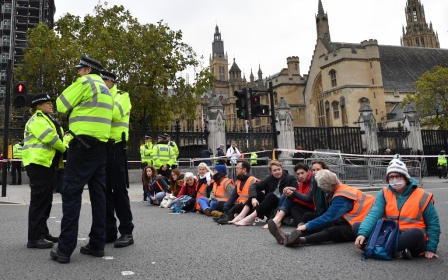A review of the Prevent review: Shawcross's guide to 'good Islam'
In 2012, William Shawcross, then director of the Henry Jackson Society, gave a speech in the US in which he said: "Europe and Islam is one of the greatest, most terrifying problems of our future.
"I think all European countries have vastly, very quickly growing Islamic populations."
These comments reflect the spirit of Shawcross’s allegedly independent review of the controversial Prevent Strategy, published earlier this month.
With the flames of existential threat fanned, the Shawcross report sets the stage to restyle the Prevent Strategy towards Muslims in full force
Shawcross, best known for his advocating of extrajudicial detention camps such as Guantanamo Bay and torture techniques like waterboarding, spends most of the 190-page report reminding the reader why the War on Terror exists in the first place: Muslims present an exceptional threat. Britain must provide an exceptional response.
The far right, the Shawcross report claims, does not pose the same threat. The report notes the fear some may have in matching his fixation on Islamists. But it must be done at all costs. The public must overcome their worry of appearing racist or Islamophobic.
New MEE newsletter: Jerusalem Dispatch
Sign up to get the latest insights and analysis on Israel-Palestine, alongside Turkey Unpacked and other MEE newsletters
The Shawcross report insists: "The value of preventing people from being radicalised into terrorism is incalculable."
With the flames of existential threat are fanned, the Shawcross report also sets the stage to restyle the Prevent Strategy, full force towards Muslims.
Bring Islam back to Prevent
There has always been tension in counter-extremism. One camp would like to expand counter-extremism to every form of violence, including misogyny.
Tim Squirrell, from the Institute for Strategic Dialogue (ISD), for example, claims "[Andrew] Tate clearly represents a risk of radicalising young men into misogynist extremism". In doing so, this camp of counter-extremists is attempting to make counter-extremism "colour blind".
For the past few years, the Prevent Strategy also belonged to this first camp. It targeted Muslims initially, but its operations are now colour-blind and "threat-agnostic".
Shawcross, sitting firmly in the second camp of counter-extremism, detests this colour blindness. He sees it as weakness towards the real threat, which is Islamism.
To be clear, Shawcross's reaction is owed in part to the fact that the racism in colourblind strategies like Prevent is not acknowledged.
He is not entirely against the idea of other threats besides Muslims, but he is not satisfied with this colourblindness. (Incidentally, critics of the Prevent strategy also oppose its colourblindness, but that is because colourblindness legitimises the racism within these strategies).
Shawcross wants the quiet part said aloud.
Shawcross attempts to justify his claims that the threat posed by Islamists is undermined and underestimated in Prevent. For example, his report criticises the "mixed/unstable/unclear" category in Prevent referral statistics.
He discovered this colourblind category houses more Muslims than official Prevent statistics reveal.
Ironically, this had been the exact argument of Prevent critics for years, including ourselves.
The Shawcross report relies heavily on case studies to argue that Islamists should take precedence and the threat posed by the Far Right is exaggerated.
The report is sprinkled with examples of Muslims who committed acts of violence - not all within the UK - as an indication of the nature of the threat. It is devoid of any context of the demographics of Muslims in the UK, and the little relation they have to any form of violence.
This framing is key. The Shawcross report is rooted in the narratives of the right-wing think tanks, the Policy Exchange and the Henry Jackson Society.
These think tanks peddle the idea that Islam presents an existential threat to liberal-secular societies if left unchecked.
Unironically, these narratives have been expressed in the propaganda of far-right murderers like Brenton Tarrant.
Yet, the Shawcross review evades how such violence is rooted in narratives that are completely normalised in public discourse. According to him, only fringe extreme right-wing groups (e.g. neo-nazis) are of concern here.
'Bad Muslim'
If the much-belated release of the William Shawcross review of the UK counter-terrorism Prevent strategy tells us anything, it is that we can do away with the myth that there is a "good Muslim".
Permeated across the pages of the review is a deep mistrust of Muslims, regurgitating right-wing tropes that emphasise Islamic ideology as a root cause of terrorism.
The Shawcross report challenges the Prevent Strategy’s evolution, which has led to a focus on the vulnerabilities that might leave one exposed to the process of radicalisation.
What the Shawcross report wants for the Prevent Strategy is in effect a tightly managed Muslim civil society drawn on decades of vilification, sensationalism and dog-whistling
The focus ought to be unapologetically on rooting bad Islam out of society.
To make this point, the Shawcross report gives the impression one can clearly delineate bad, non-violent extremist Islamic ideas from good, liberal-secular Islamic ideas. This distinction is essential to his entire review.
Somehow, the Shawcross report hopes to draw hard lines within centuries of complicated, nuanced, and often conflicting Islamic schools of thought.
For the new Prevent strategy to shift from vulnerability and ideology, it will depend on revealing this clear distinction between good and bad Islam and then standardising this distinction in policy and practice.
But it is never made clear how Shawcross differentiates bad Muslims from good ones.
He relies instead heavily on case examples to indicate the spirit of a line where Islam breaks bad.
Scholars of Islamophobia will not find any of Shawcross's examples of Islamism surprising: the critique of Zionism, opposition to domestic and international policies, conservative religious views, etc.
Furthermore, Shawcross attempts to separate Islam from Islamism by suggesting the latter indicates Muslims who place Islam, "at the centre of an individual’s identity, and must govern all social and political decision-making".
This is coupled with ideas around campaigning for the "oppressed" which he writes in inverted commas to indicate his questioning of that category. There is something suspicious, it seems, when Muslims are concerned about their treatment both domestically and across the world.
What the Shawcross report wants for the Prevent Strategy is in effect a tightly-managed Muslim civil society drawn on decades of vilification, sensationalism, and dog-whistling.
Shawcross's report clearly draws inspiration from countries like France, where Muslim organisations have been shut down for the same purpose.
Shawcross is attempting to create a fracture between those Muslims who either keep to themselves or only politicise themselves according to State interests on the one hand, and those who centre their faith in their politics on the other.
This is how Shawcross distinguishes between: "Islamists, those who subscribe to and promote a hard-line political ideology, and Muslims, those who follow and practise Islam."
A sword and a shield
Under Shawcross, the Prevent Strategy is refashioned as a sword and shield to counter ideological threats. He makes no pretence that the Prevent Strategy itself is not ideological.
Indeed, he insists Prevent officials must be trained in ideology to gauge – perhaps through ideological and religious purity tests – those who fall outside what the state deems to be the ‘good.’
The closer Muslims align their faith to state interests, the better.
There is one significant irony to this, however: the Prevent Review indicates how tenuous any link to the state is. In fact, Shawcross specifically hounds Muslims who worked closely with the UK government and received Prevent funding.
According to him, these Muslims flew too close to "extremism" by, for example, sharing a video of a protest for Palestine where a song by rapper Lowkey is playing in the background.
This is indeed how unstable the "good Muslim" category is.
Within the footnotes of the report, Dr Musharraf Hussain is mentioned - a man who received Prevent funding and even attended sponsored trips to Israel (a move that was heavily condemned by Muslim groups in the UK).
Despite this, Shawcross removed Hussain from the ranks of the "good Muslim" due to online posts that ostensibly called for the rights of Palestinians. It seems the securitisation of pro-Palestinian narratives will intensify further under Shawcross.
Furthermore, the Shawcross report highlights the role of the very opaque Extremism Disruptions Unit (EDU).
The EDU is a body that is able to disrupt the lives of Muslims in the UK without any transparency, as informed by right-wing think tanks and outfits.
But every accusation of "extremism" towards Muslims carries dire consequences in their lives and is not to be taken lightly.
In the end, the Prevent Review is seeking to legitimise prejudicial referrals based on gut feelings, without the fear of being labelled a racist or an Islamophobe
In the end, the Prevent Review is seeking to legitimise prejudicial referrals based on gut feelings, without the fear of being labelled a racist or an Islamophobe. That is the goal of the Shawcross report.
The Tories have been concerned for a while about the implications of "cancel culture".
But the extent to which Muslims, en masse, have been either censored or self-censor, is tremendous, and well documented in research.
As William Shawcross attempts to redefine the boundaries of acceptable Islam in the Prevent Review, Muslims will face new challenges in practising their faith and exercising their democratic rights without state surveillance and management.
The views expressed in this article belong to the authors and do not necessarily reflect the editorial policy of Middle East Eye.
Middle East Eye delivers independent and unrivalled coverage and analysis of the Middle East, North Africa and beyond. To learn more about republishing this content and the associated fees, please fill out this form. More about MEE can be found here.





